Soil health is being affected
According to the Department of Crop Production (Ministry of Agriculture and Rural Development), land is a special non-renewable means of production. The promotion of soil improvement and intensive farming in recent times has brought many achievements to Vietnam's agricultural sector. However, with the characteristic that 70% of cultivated land in Vietnam is located on steep terrain, leading to the phenomenon of erosion, degradation, and nutrient depletion in highly intensive farming areas; the excessive use of pesticides also affects the health of soil and crops.
Statistics from the Ministry of Natural Resources and Environment in 2021 show that the country's agricultural land group is over 27.9 million hectares (agricultural land types include agricultural land, forestry, aquaculture, salt production and other agricultural land). In the agricultural land group, the rice-growing land area is over 3.9 million hectares; protective forest land and special-use forest land is over 7.3 million hectares. The area of non-agricultural land group is 3,949,158 hectares.
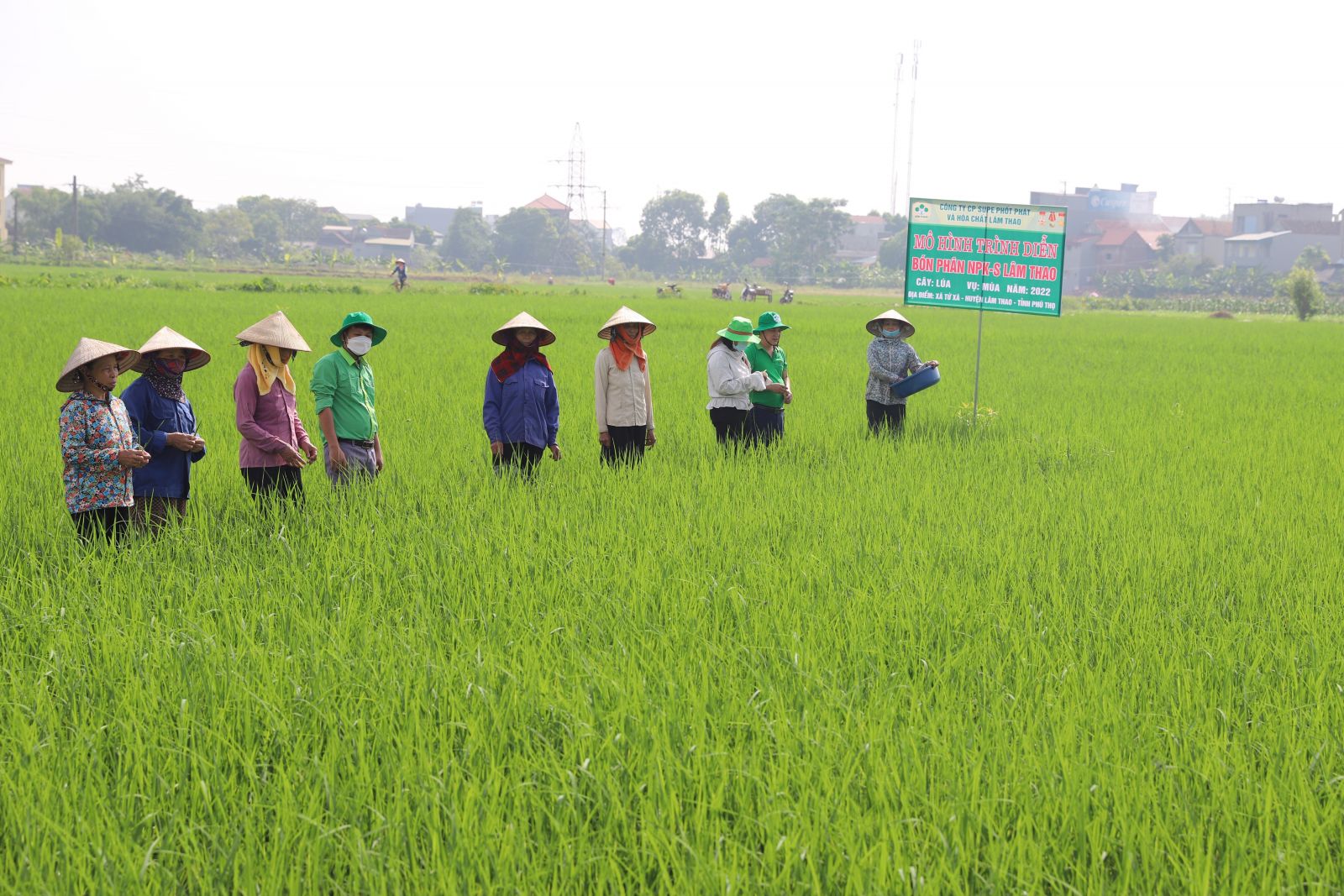
NPK fertilizer demonstration model of Lam Thao Super Phosphate and Chemical Joint Stock Company (Phu Tho). Photo: PV
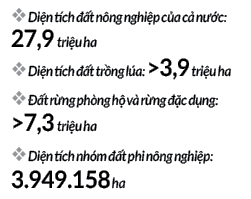
Cultivated land has been seriously degraded due to the practice of growing multiple crops a year; long-term abuse of fertilizers has led to the soil becoming hard and losing its porosity.
Monoculture farming practices take away the nutritional quality of the soil. In addition, fruit growing areas only focus on NPK, leading to nutritional imbalances in the soil; not allowing the soil to rest; incomplete data systems, and ineffective market forecasting information are also the causes of soil degradation. Typically, the Red River Delta has a high land use coefficient; the Central Highlands intensively cultivates industrial crops such as coffee, pepper, etc., making the pH in the soil many times higher than the natural index.
The Department of Crop Production said that in 2024, the Ministry of Agriculture and Rural Development had many activities to improve soil health, for example, the Ministry issued a directive on improving soil health with a vision to 2030 with 5 key tasks and 8 solutions. The Department of Crop Production has built a soil database software to investigate and survey the current soil status in risky areas; organized workshops...; developed a strategy to manage the country's soil health related to the agricultural sector to submit to the Government for promulgation.
Meanwhile, Mr. Nguyen Quang Tin - Deputy Director of the Department of Science, Technology and Environment (Ministry of Agriculture and Rural Development) said that to have a database on cultivated land, it is necessary to systematize and complete the research. "We propose that by early 2025, the Ministry's research institutes and agencies participating in the project need to join hands to complete the database," said Mr. Tin.
Mr. Tin said that one of the weaknesses of land is that our country does not have an application (app) for land data, output as well as input. "Almost every year there are research projects on land and fertilizers, but they are still scattered. We need coordinated, large-scale programs such as research on rice varieties and crop varieties" - Mr. Tin emphasized.
Protecting soil health - an important task
Speaking at the conference to deploy the Project "Improving soil health and plant nutrition management to 2030, vision to 2050" recently organized by the Ministry of Agriculture and Rural Development, Deputy Minister of Agriculture and Rural Development Hoang Trung emphasized that soil is a special means of production, the home of ecosystems. Therefore, soil health is an issue of concern to both Vietnam and many countries in the world.
Currently, the average land area per capita is low; combined with intensive farming practices, monoculture, unbalanced use of fertilizers and pesticides; soil pollution due to the development of industrial zones and craft villages; the impact of climate change leading to drought, salinity intrusion, acidification... have seriously degraded soil health.
Deputy Minister Hoang Trung assigned the Plant Protection Department to participate in developing the details of the Project "Improving soil health and plant nutrition management to 2030, vision to 2050". After that, the Ministry will organize to listen to public opinions before officially issuing it. The Department of Crop Production in coordination with the Plant Protection Department must carefully evaluate each series of land in each locality, from which to build a set of criteria to evaluate which land is suitable for which plant. This will also contribute to changing farming practices in a positive direction.
Regarding the project on the development and use of organic fertilizers, the leaders of the Ministry of Agriculture and Rural Development said that it has been implemented since 2017 and has had many practical changes. In 2023, the amount of organic fertilizer put into use was 3 million tons, compared to a total of 7 million tons of organic and inorganic fertilizers. This figure shows that organic fertilizers are being used more. The National Agricultural Extension Center is assigned to coordinate with the Department of Crop Production to organize training for grassroots cadres. This is the key factor in bringing the project to life.
Mr. Phung Ha - Chairman of Vietnam Fertilizer Association:
Too much fertilizer residue in the soil
The relationship between soil and plants is natural, between soil and plants is fertilizer. Plants need fertilizer to grow, if fertilizer is not used, 50% of the population will lack food.
The current situation in Vietnam is that there is too much fertilizer residue in the soil and it is higher than the world average, especially the excessive use of inorganic fertilizers. Secondly, the task for the fertilizer industry is to reduce organic fertilizers and increase organic fertilizers.
Mr. Vu Thang - Deputy Head of Fertilizer Management Department - Plant Protection Department (Ministry of Agriculture and Rural Development):
Perfecting the farming process combined with effective fertilizer use
The project "Improving soil health and plant nutrition management to 2030, vision 2050" aims to improve the effectiveness of State management of soil health and plant nutrition and build a database on the quality of major soil types, in parallel with the use of fertilizers for key crops.
In addition, a set of indicators and a hierarchy of indicators to assess soil health in terms of physics, chemistry and biology according to major soil types and key crops are also developed in accordance with regional and international standards. In addition, the project aims to perfect the cultivation process associated with effective fertilizer use.
Thereby, reducing nutrient loss on the main soil for growing key crops, contributing to stabilizing and improving the health of cultivated soil, protecting and developing a diverse system of beneficial organisms, and reducing greenhouse gas emissions.
The project promotes training programs and documents on soil health and fertilizer use guidelines to improve the capacity of management and technical staff. In addition to building a network of technical staff to serve the work of improving soil health and plant nutrition management, it is necessary to promote to receive the attention of the community and the participation, coordination and support of experts, scientists and manufacturers.
PV (record)
Source: https://danviet.vn/thu-truong-bo-nnptnt-de-nghi-thuc-hien-giai-phap-nang-cao-suc-khoe-dat-ngoi-nha-cua-cac-he-sinh-thai-20241021161849239.htm



![[Photo] "Lovely" moments on the 30/4 holiday](https://vphoto.vietnam.vn/thumb/1200x675/vietnam/resource/IMAGE/2025/5/1/26d5d698f36b498287397db9e2f9d16c)
![[Photo] Binh Thuan organizes many special festivals on the occasion of April 30 and May 1](https://vphoto.vietnam.vn/thumb/1200x675/vietnam/resource/IMAGE/2025/5/1/5180af1d979642468ef6a3a9755d8d51)


![[Photo] Ha Giang: Many key projects under construction during the holiday season](https://vphoto.vietnam.vn/thumb/1200x675/vietnam/resource/IMAGE/2025/5/1/8b8d87a9bd9b4d279bf5c1f71c030dec)

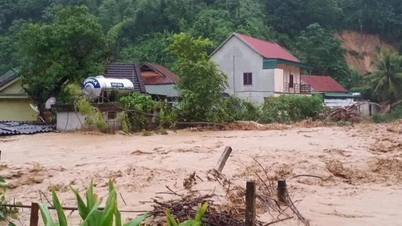
![[Photo] Soldiers and workers help people build houses](https://vphoto.vietnam.vn/thumb/402x226/vietnam/resource/IMAGE/2025/5/1/3a705ca5655e44f3a6d0554f0bf0563d)


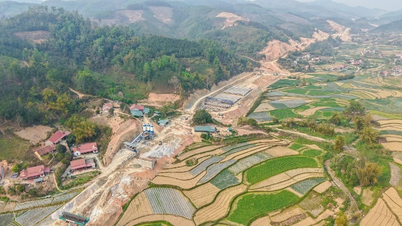









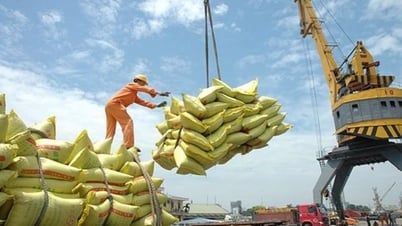

























































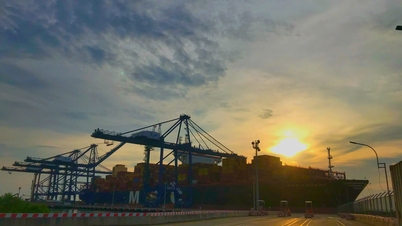















Comment (0)